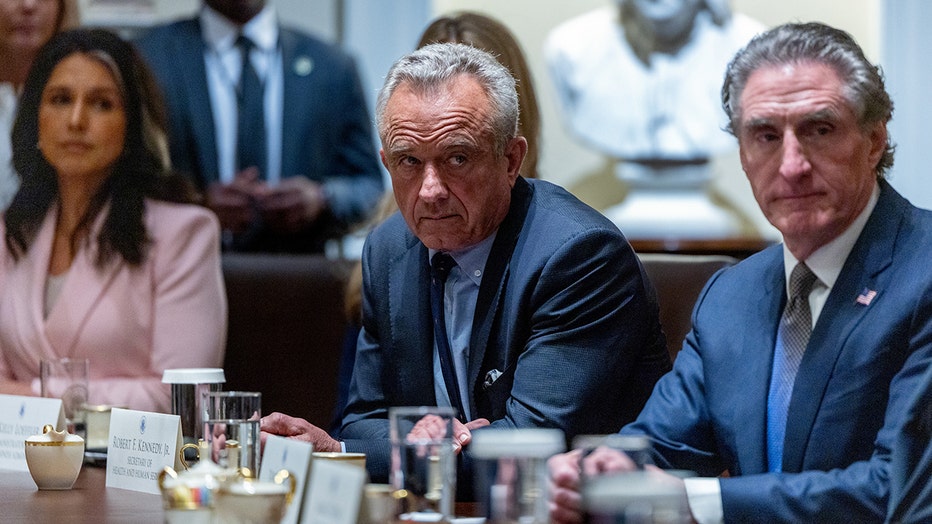RFK Jr. pledges HHS will determine cause of autism by September
Pres. Trump holds full cabinet meeting
President Trump held his first cabinet meeting after announcing a 90-day tariff delay. Tariffs, immigration, DOGE, health, and the military were all topics of discussion. Cabinet members spoke about the progress made achieving President Trump's agenda. | Raw & unfiltered. Watch a non-stop stream of breaking news, live events and stories across the nation.
WASHINGTON - Health and Human Services Secretary Robert F. Kennedy Jr. said the agency is taking on a "massive testing and research effort" to determine the cause of autism, which will be completed by September.
Kennedy, who has been a longtime vaccine critic and pushed a discredited theory that routine childhood shots cause autism, made the announcement on Thursday.

Tulsi Gabbard, director of National Intelligence, from left, Robert F. Kennedy Jr., US secretary of Health and Human Services (HHS), and Doug Burgum, US secretary of the interior, during a cabinet meeting at the White House in Washington, DC, US, on
Here’s what to know about the HHS research effort:
HHS to determine cause of autism, RFK Jr. says
What we know:
Kennedy said the autism research effort will involve hundreds of scientists. On Thursday, he shared plans with President Donald Trump during a televised cabinet meeting.
"We’ve launched a massive testing and research effort that’s going to involve hundreds of scientists from around the world," Kennedy told Trump during the Cabinet meeting. "By September, we will know what has caused the autism epidemic, and we’ll be able to eliminate those exposures."
Kennedy has hired David Geier, a man who has repeatedly claimed a link between vaccines and autism, to lead the effort. The hiring of Geier, who the state of Maryland found was practicing medicine on a child without a doctor's license, was first reported by The Washington Post.
During the televised meeting, Trump suggested that vaccines could be to blame for the increasing autism diagnosis rates – although decades of research have concluded there is no link between the two.
"There's got to be something artificial out there that's doing this," Trump told Kennedy. "If you can come up with that answer, where you stop taking something, eating something, or maybe it's a shot. But something's causing it."
Big picture view:
Autism is a developmental disability caused by differences in the brain. It presents with a wide range of symptoms that can include delays in language, learning, and social or emotional skills. Autism is called a "spectrum" disorder because people experience different types of symptoms, with some needing a lot of help in their daily lives, and others needing less.
Research has suggested that autism spectrum disorder (ASD) develops from a combination of genetic influences and environmental influences, including social determinants.
But there’s scientific consensus that childhood vaccines don’t cause autism. Leading autism advocacy groups, including Autism Speaks, agree.
What they're saying:
"Autism is often diagnosed around the same time children receive routine vaccinations, which has led to concerns about a connection—but decades of scientific research have confirmed that vaccines do not cause autism," Autism Speaks states on its website. "In fact, vaccines play a crucial role in protecting children from serious diseases like measles."
Dig deeper:
Research, including studies of twins, shows genes play a large role. No single environmental factor has been deemed a culprit. The National Institutes of Health, which already spends more than $300 million yearly researching autism, lists some possible risk factors such as prenatal exposure to pesticides or air pollution, extreme prematurity or low birth weight, certain maternal health problems or parents conceiving at an older age.
What we don't know:
For his part, Kennedy did not share details about how his study would be different or what researchers would be involved in the effort. Leading autism organizations, such as the Autism Society of America, have not been included in discussions about the research, ASA spokeswoman Kristyn Roth told the Associated Press.
Autism rate in US
By the numbers:
Over the past two decades, the prevalence of autism spectrum disorders has "increased markedly," according to the U.S. Centers for Disease Control and Prevention.
Roughly 1 in 36 children in the U.S. are estimated to have ASD, up from the previous rate of 1 in 44 in 2018, estimates from the CDC's Autism and Developmental Disabilities Monitoring (ADDM) Network show.
ASD is nearly 4 times more common among boys than among girls, CDC research shows.
Around the world, 1 in 100 children are diagnosed, according to Autism Speaks.
What we know:
Trump and Kennedy have both expressed concerns about rising autism rates. Some of that increase is due to increased awareness and a change in how the disability is diagnosed. For decades, the diagnosis was given only to kids with severe problems communicating or socializing and those with unusual, repetitive behaviors. But milder autism case diagnoses have become far more common over the past couple of decades.
With improved screening and autism services, diagnosis is increasingly happening at younger ages, too. And there’s been more awareness and advocacy for Black and Hispanic families, leading to an increase in autism diagnoses among those groups.
Still, anti-vaccine advocates, including Kennedy, have claimed that vaccines are to blame. The theory largely stems from a 1998 paper that was later retracted. Scientists have since ruled out a link between vaccines and autism, finding no evidence of increased rates of autism among those who are vaccinated compared to those who are not, according to the CDC.
"Some people with ASD have a known difference, such as a genetic condition. Other causes are not yet known," the CDC states on its website.
The Source: This story was reported using information provided by HHS Secretary Robert F. Kennedy, Jr., the U.S. Centers for Disease Control and Prevention, Autism Speaks, and the White House. It was reported from Cincinnati, and the Associated Press contributed.

